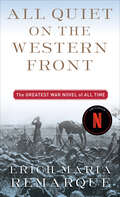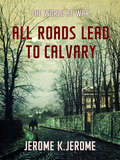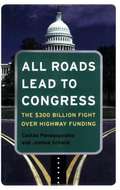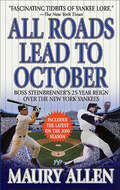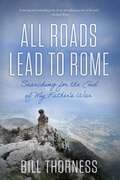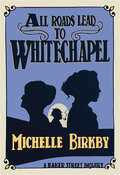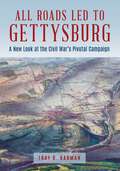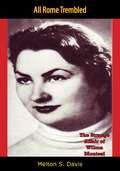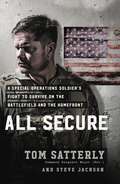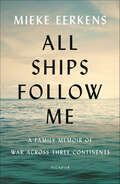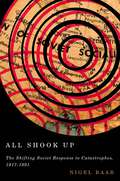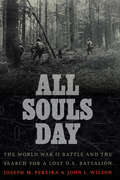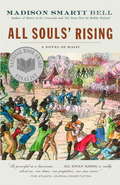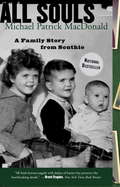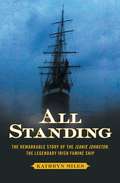- Table View
- List View
All Quiet on the Western Front: A Novel (All Quiet on the Western Front #1)
by Erich Maria Remarque Arthur Wesley WheenPaul Baumer enlisted with his classmates in the German army of World War I. <P><P>Youthful, enthusiastic, they become soldiers. <P>But despite what they have learned, they break into pieces under the first bombardment in the trenches. <P>And as horrible war plods on year after year, Paul holds fast to a single vow: to fight against the principles of hate that meaninglessly pits young men of the same generation but different uniforms against each other--if only he can come out of the war alive.
All Religions Are Good in Tzintzuntzan: Evangelicals in Catholic Mexico
by Cahn Peter S.Since the 1960s, evangelical Christian denominations have made converts throughout much of Roman Catholic Latin America, causing clashes of faith that sometimes escalate to violence. Yet in one Mexican town, Tzintzuntzan, the appearance of new churches has provoked only harmony. Catholics and evangelicals alike profess that "all religions are good," a sentiment not far removed from "here we are all equal," which was commonly spoken in the community before evangelicals arrived. In this paradigm-challenging study, Peter Cahn investigates why the coming of evangelical churches to Tzintzuntzan has produced neither the interfaith clashes nor the economic prosperity that evangelical conversion has brought to other communities in Mexico and Latin America. Drawing on extensive ethnographic fieldwork, he demonstrates that the evangelicals' energetic brand of faith has not erupted into violence because converts continue to participate in communal life, while Catholics, in turn, participate in evangelical practices. He also underscores how Tzintzuntzan's integration into global economic networks strongly motivates the preservation of community identity and encourages this mutual borrowing. At the same time, however, Cahn concludes that the suppression of religious difference undermines the revolutionary potential of religion.
All Roads Lead Home
by Christine JohnsonHendrick Simmons despises her. Mariah Meeks doesn't blame him-not after she rejected the handsome mechanic's proposal two years ago. She's certain she's not meant for marriage. All Mariah's energy goes to one purpose-her work as an agent of the Orphaned Children's Society.Now a prodigal father's return threatens a boy under Mariah's care. Mariah insists on approving the lad's future home for herself, even though it requires a cross-country drive that's too dangerous to take on her own. For the child's sake, Hendrick agrees to join her. Can a journey of 2,000 miles bridge the distance between them...and reveal where Mariah truly belongs?
All Roads Lead to Calvary (The World At War)
by Jerome K. JeromeThe novel "All Roads Lead to Cavalry" offers an irreverent take on the social forces at play in England in the period leading up to and just following the outbreak of World War I. If you're interested in history but often find yourself bored by historical fiction, this funny, one-of-a-kind novel is for you. (Google)
All Roads Lead to Congress: The $300 Billion Fight over Highway Funding
by Costas Panagopoulos Joshua SchankIn this case study of the US legislative process, Panagopoulos (political science, Fordham U.) and Schank (director of transportation research, Bipartisan Policy Center) follow the two-year path of the Safe, Affordable, Flexible, and Efficient Transportation Equity Act: A Legacy for Users (SAFETEA-LU) from its introduction in Congress to its arrival on the President's desk, a process they personally observed while working as fellows in the office of Senator Hillary Clinton. Annotation ©2008 Book News, Inc., Portland, OR (booknews.com)
All Roads Lead to October: Boss Steinbrenner's 25-Year Reign Over the New York Yankees
by Maury AllenAll Roads Lead to October presents an up close and personal look at the New York Yankees under legendary owner George Steinbrenner.George Herman Ruth was the Babe. Lou Gehrig was the Iron Horse. Joe DiMaggio was the Yankee Clipper. George Steinbrenner is the Boss.On a rainy January morning, 1973, a press conference is called that will change the face of the Yankees forever. A young Cleveland Industrialist by the name of Steinbrenner stands at New York's famed 21 Club and announces his new ownership of the Yankees. And so begins the Steinbrenner era, the era of the Boss. Now with five World Championships to his name, Steinbrenner is not only the owner of one of the past century's winningest baseball teams, but a legendary figure in his own right. Both eccentric and egocentric, Steinbrenner's unique approach to the game turned a not-so-good 1973 Yankees squad into World Champions just five years later.As integral to the history of the Yankees as DiMaggio or Ruth, All Road Lead to October examines the team under Steinbrenner's reign. Having covered the Yankees since Steinbrenner came aboard, acclaimed sports journalist and noted author Maury Allen examines the complex and often fiery relationships the owner had with the likes of Billy Martin, Reggie Jackson, Yogi Berra, Joe Torre, Darryl Strawberry and many others. Here are the first hand, insider's accounts of the pivotal events in the Yankees rise to power. Covering both off the field and on the field controversies like Yankees pitchers Fritz Peterson and Mike Kekich's wife swapping, the angry tirades, fights and often brilliant coaching moves of the misunderstood Billy Martin, the inside story of the signing of Reggie Jackson whose ego was as big as his bat, and the Yankees rise to baseball dominance with the likes of Jeter, Williams, El Duque, Clemens, Rivera and Torre, Maury Allen give an exclusive look at all the action. Allen was there through it all, from Steinbrenner's first press conference, through the death of Catfish Hunter, the World Series wins, the controversial trades and firings, and even when a drunk Billy Martin banged on his hotel room door one night madder than hell. This is the definitive look at not only the Boss, the but the New York Yankees, the most celebrated team of the twentieth century.
All Roads Lead to Rome: Searching for the End of My Father's War
by Bill ThornessWhat happens when a seasoned journalist and travel writer takes on his most challenging assignment yet—crossing not just continents but also history—by retracing his father&’s steps on the battlefields of Italy in World War II? When a slim packet of his father&’s letters came to light after his mother&’s death, Bill Thorness began a quest to rediscover his father. Thorness traveled to the World War II battlefields where America&’s first team of commandos fought. The youngest son of one of those commandos, Thorness gained a sense of the horror his father had kept from his family while standing on the mountain where the First Special Service Force fought. Then, standing on a bridge in Rome, he reflected on the loss his father must have felt in not making it to the end of the campaign to liberate the Eternal City. In All Roads Lead to Rome Thorness considers his father&’s decisive moments in battle and beyond, and how he soldiered on as a disabled veteran through his life, raising a family and succumbing to an early death. Alternating between reimagined battle scenes and present-day travels, Thorness explores World War II and family history, the value and limits of memory, the attitudes of war, and our society&’s inadequate understanding and support of combat veterans, who may return with physical and emotional scars that change them deeply. Thorness steps into his father&’s shoes to revisit his story and finish that walk into Rome, weaving an account that is part travelogue, part history, and part memoir about the ravages of war.
All Roads Lead to Whitechapel (The Baker Street Inquiries #1)
by Michelle BirkbySherlock’s landlady and Dr. Watson’s wife help a blackmailed woman only to find themselves in a murder case in this mystery series debut.The women in Sherlock Holmes’s life have grown tired of toiling in his shadow. Matters come to a head when the Great Man declines to help a desperate young bride, prompting Mrs. Hudson (Holmes’s housekeeper) and Mary Watson (wife to the good Doctor) to set up a sleuthing shop of their own, operating out of the kitchen at 221B Baker Street. Every clue they untangle leads to, yes, the grim slums of Whitechapel, where Jack the Ripper appears still to be busy with his carving knives. With so many women in terrible danger, it seems only appropriate that it’s women who will set things right.“Appealing characters, gruesome homicides, and a detailed period setting in a blend as balanced as a perfect cup of tea. Enjoyable fare for both die-hard Sherlock-ians and newcomers to the canon.” —Kirkus Reviews“Fun. . . . Mrs. Hudson and Mary make an appealing pair, sure to win the hearts of some Holmes fans.” —Publishers Weekly
All Roads Led to Gettysburg: A New Look at the Civil War's Pivotal Battle
by Troy D. HarmanIt has long been a trope of Civil War history that Gettysburg was an accidental battlefield. General Lee, the old story goes, marched blindly into Pennsylvania while his chief cavalryman Jeb Stuart rode and raided incommunicado. Meanwhile, General Meade, in command only a few days, gave uncertain chase to an enemy whose exact positions he did not know. And so these ignorant armies clashed by first light at Gettysburg on July 1, 1863. In the spirit of his iconoclastic Lee&’s Real Plan at Gettysburg, Troy D. Harman argues for a new interpretation: once Lee invaded Pennsylvania and the Union army pursued, a battle at Gettysburg was entirely predictable, perhaps inevitable.Most Civil War battles took place along major roads, railroads, and waterways; the armies needed to move men and equipment, and they needed water for men, horses, and artillery. And yet this perspective hasn&’t been fully explored when it comes to Gettysburg. Look at an 1863 map, says Harman: look at the area framed in the north by the Susquehanna River and in the south by the Potomac, in the east by the Northern Central Railroad and in the west by the Cumberland Valley Railroad. This is where the armies played a high-stakes game of chess in late June 1863. Their movements were guided by strategies of caution and constrained by roads, railroads, mountains and mountain passes, rivers and creeks, all of which led the armies to Gettysburg. It&’s true that Lee was disadvantaged by Stuart&’s roaming and Meade by his newness to command, which led both to default to the old strategic and logistical bedrocks they learned at West Point—and these instincts helped reinforce the magnetic pull toward Gettysburg.Moreover, once the battle started, Harman argues, the blue and gray fought tactically for the two creeks—Marsh and Rock, essential for watering men and horses and sponging artillery—that mark the battlefield in the east and the west as well as for the roadways that led to Gettysburg from all points of the compass. This is a perspective often overlooked in many accounts of the battle, which focus on the high ground—the Round Tops, Cemetery Hill—as key tactical objectives.Gettysburg Ranger and historian Troy Harman draws on a lifetime of researching the Civil War and more than thirty years of studying the terrain of Gettysburg and south-central Pennsylvania and northern Maryland to reframe the story of the Battle of Gettysburg. In the process he shows there&’s still much to say about one of history&’s most written-about battles. This is revisionism of the best kind.
All Rome Trembled: The Strange Affair of Wilma Montesi
by Melton S. DavisTHE WILMA MONTESORI SCANDALThe nude body on the beach exploded Italy’s “Scandal of the Century.” Among the participants was a seemingly placid family group, with the beautiful young victim in its midst; suave Marchese from the South; his raven-haired mistress, one of Italy’s newly emancipated girl-women of the North; a jazz pianist, son of one of the nation’s rulers; his inamorata, a famous, still-lovely film star; a disillusioned, disoriented existentialist; her lover, a wild-eyed, drug-taking painter; maneuvering politicos of the Centre; an eager young editor who thought an exposé would set things right; the dynamic head of the nation’s security forces, who had too many friends; the fat chief of Rome’s police, who had too few; the smart Communist lawyer who was suddenly splattered with the mud he had hurled; the mountainous detective, ruthless in his investigations, breasting diversionary waves as he pushed towards terrible conclusions; and the carefree nephew of the ex-King of Italy…“Sensational”—New York Herald Tribune
All Scot and Bothered (Devil You Know #2)
by Kerrigan ByrneAll Scot and Bothered is the second book in the stunning Devil You Know series by USA Today bestselling author Kerrigan Byrne!They are a dangerous duke, a fierce lord, and an infamous earl—dark, bold, brave men who know exactly what they want. And there is only one woman who can bring them to their knees...He is first and foremost—at everything. A man who’s made his own way through ruthless cunning and sheer force of will. A strong and imposing Scot who can turn on the charm but does not suffer fools. His title: Lord Chief Justice of the High Court. His name: Cassius Gerard Ramsay. His mission: To investigate the goings-on at London's most notorious gaming hell, owned and operated by one of the most intriguing and desirable women he’s ever met.IN THIS GAME OF LOVE, THE RULES DO NOT APPLYCecelia Teague was an orphan facing a rather dire future—until a secret benefactor from her mother’s scandalous past swept into her life. Sent to a prestigious boarding school and later to university, Cecelia believed high society was at her fingertips...Then, from out of nowhere, she became the inheritor of a gambling establishment. Now Cecelia must live two lives: one as a proper lady who finds herself undeniably drawn to Lord Ramsay and the other as a savvy gaming hell owner trying to save her business from the very same man. He has no idea she is both women...and Cecelia would like to keep it that way. But what happens when consuming passion and escalating danger threaten to reveal the truth?"With the Devil You Know series, Byrne once again delivers the beautifully nuanced characters and seductive storytelling her readers have come to expect."—Booklist
All Secure: A Special Operations Soldier's Fight to Survive on the Battlefield and the Homefront
by Steve Jackson Tom SatterlyOne of the most highly regarded Tier One Delta Force operators in American military history shares his war stories and personal battle with PTSD.As a senior non-commissioned officer of Delta Force, the most elite and secretive special operations unit in the U.S. military, Command Sergeant Major Tom Satterly fought some of this country's most fearsome enemies. Over the course of twenty years and thousands of missions, he's fought desperately for his life, rescued hostages, killed and captured terrorist leaders, and seen his friends maimed and killed around him. All Secure is in part Tom's journey into a world so dark and dangerous that most Americans can't contemplate its existence. It recounts what it is like to be on the front lines with one of America's most highly trained warriors. As action-packed as any fiction thriller, All Secure is an insider's view of "The Unit." Tom is a legend even among other Tier One special operators. Yet the enemy that cost him three marriages, and ruined his health physically and psychologically, existed in his brain. It nearly led him to kill himself in 2014; but for the lifeline thrown to him by an extraordinary woman it might have ended there. Instead, they took on Satterly's most important mission-saving the lives of his brothers and sisters in arms who are killing themselves at a rate of more than twenty a day. Told through Satterly's firsthand experiences, it also weaves in the reasons-the bloodshed, the deaths, the intense moments of sheer terror, the survivor's guilt, depression, and substance abuse-for his career-long battle against the most insidious enemy of all: Post Traumatic Stress. With the help of his wife, he learned that by admitting his weaknesses and faults he sets an example for other combat veterans struggling to come home.
All Ships Follow Me: A Family Memoir of War Across Three Continents
by Mieke EerkensAn engrossing, epic saga of one family’s experiences on both sides of WWII, All Ships Follow Me questions our common narrative of the conflict and our stark notions of victim and perpetrator, while tracing the lasting effects of war through several generations.In March 1942, Mieke Eerkens’ father was a ten-year-old boy living in the Dutch East Indies. When the Japanese invaded the island he, his family, and one hundred thousand other Dutch civilians were interned in a concentration camp and forced into hard labor for three years. After the Japanese surrendered, Mieke’s father and his family were set free in a country that plunged immediately into civil war. Across the globe in the Netherlands, police carried a crying five-year-old girl out of her home at war’s end, abandoned and ostracized as a daughter of Nazi sympathizers. This was Mieke's mother. She would be left on the street in front of her sealed home as her parents were taken away and imprisoned in the same camps where the country’s Jews had recently been held. Many years later, Mieke’s parents met, got married, and moved to California, where she and her siblings were born. While her parents lived far from the events of their past, the effects of the war would continue to be felt in their daily lives and in the lives of their children.All Ships Follow Me moves from Indonesia to the Netherlands to the United States, and spans generations, as Mieke recounts her parents' lives during and just after the war, and travels with them in the present day to the sites of their childhood in an attempt to understand their experiences and how it formed them. All Ships Follow Me is a deeply personal, sweeping saga of the wounds of war, and the way trauma can be passed down through generations.
All Shook Up
by J. M. SnyderThe year is 1883. Eduard van De Lier is a Dutchman overseeing a spice plantation on the island of Java, in the South Pacific. His obsessive attraction to dark-skinned men is just one of his many secrets. His wife Marien knows of his indiscretions, but as she's content with their Colonial lifestyle, she stays silent.Until a former lover of Eduard's shows up in their parlor with thoughts of blackmail.Reza was a crewman on the ship that brought the van De Liers to Java. During the passage, Eduard spent many a night in the younger man's arms. Two years have passed, and the last person Eduard expects to find in his drawing room is Reza, a letter in hand that could destroy the life he and Marien lead.Seeing him again ignites Eduard's lust for his first dark lover. He hopes to retrieve the letter, either through seduction or subterfuge, and the longer Reza eludes him, the more his desire grows. But they're on shaky ground, and before things can heat up between them, their world explodes -- literally -- when the unstable island of Krakatoa erupts.
All Shook Up: A Novel
by Enid LangbertThis YA debut speaks to the continued interest in the teen culture of the 1950s—Elvis Presley, teenage rebellion—with a young girl embarking on adventure and music, ultimately uncovering family secrets.Being fourteen is especially hard in 1956, when the world is changing around you. Honor student Paula Levy was born into a family of historical victims: her mother’s youth was lost in the Depression and her father’s was destroyed in the Holocaust, an as-yet-unnamed event about which no one speaks. But Paula has heard the new music taking hold of the nation—rock and roll—and it has given her hope. And she has two friends to get her through life’s ups and downs: Holden Caulfield, hero of Catcher in the Rye, who shares her view of the world, and Barbara, a “cool” girl in her high school who unexpectedly shares Paula’s view of Holden. Paula’s mother is not a fan of Barbara, and she prohibits her daughter from associating with her. Paula manages to get around her mother’s rule and see Barbara anyway—but when Paula asks the wrong questions about her father’s past and Barbara is caught with her “boyfriend,” their private world of Holden, rock, and Elvis Presley crumbles. Angry with the adults in their lives, the two girls run away to find Barbara’s real father, a jazz musician. Disappointingly, he does not live in a mansion or socialize with Elvis—but Paula and Barbara may find something even better.
All Shook Up: The Shifting Soviet Response to Catastrophes, 1917-1991
by Nigel RaabEarthquakes, nuclear accidents, and floods were among the many unexpected tragedies that struck the Soviet Union over its history. Requiring the immediate mobilization of vast resources and aid, and embedded within a specific context and time, these catastrophes provide critical insights into the nature of the twentieth-century Communist state. All Shook Up takes a close look at the representation in film, the political repercussions, and the social opportunities of large-scale catastrophes in separate Soviet epochs, including the 1927 earthquake in the Crimean peninsula, the 1948 earthquake in Ashgabat, the Tashkent earthquake in 1966, the Chernobyl explosion in 1986, and the Armenian earthquake in 1988. Juxtaposing various disaster responses and demonstrating the ways both Soviet authorities and citizens molded them to their own cultural needs, Nigel Raab highlights the radical shifts in disaster policy from one leader to the next. Given the opportunity to act outside regular parameters, Soviet residents not only rebuilt their devastated cities, but also experimented with new values and crafted their own worldview while the state struggled to return the situation to normal. Based on archival research conducted in Russia and Ukraine, All Shook Up fills a gap in a global literature and challenges stereotypical representations of the Soviet Union as a monolithic state.
All Shook Up: The Shifting Soviet Response to Catastrophes, 1917-1991
by Nigel RaabThe first full-length study of natural and man-made disasters in the Soviet Union.
All Sorts of Lives: Katherine Mansfield and the art of risking everything
by Claire Harman** The Sunday Times Best Literary Book of 2023**** A Waterstones Best Book of 2023**'All Sorts of Lives is a beautiful, fastidiously researched and fascinating exploration of Mansfield's life and work' A.L. KENNEDYRestless outsider, masher-up of form and convention, Katherine Mansfield’s career was short but dazzling. She was the only writer Virginia Woolf admitted being jealous of, yet by the 1950s was so undervalued that Elizabeth Bowen was moved to ask, 'Where is she – our missing contemporary?'In this inventive and intimate study, Claire Harman takes a fresh look at Mansfield’s life and achievements, through the form she did so much to revolutionise: the short story. Exploring ten pivotal works, we watch how Mansfield’s desire to grow as a writer pushed her art into unknown territory, and how illness sharpened her extraordinary vitality: ‘Would you not like to try all sorts of lives – one is so very small.’‘What a gift to the biographer, this life of adventure and sickness and sex and celebrity… Brilliant’ Sunday Times‘A searching, incisive and compulsive book. A lesson in how to read and connect and understand’ Sunjeev Sahota
All Souls Day: The World War II Battle and the Search for a Lost U.S. Battalion
by Joseph M. Pereira John L. WilsonThe U.S. Army attacked three villages near the German-Belgium border, surprising the Germans who surrendered with little resistance. The German army regrouped and counterattacked. A brief but horrific battle ensued, and as the enemy pressed forward, the Americans retreated in haste, leaving behind their wounded and their dead. Discussion of this week-long conflict that began on All Souls Day, November 2, 1944, has been confined to officer training school, in part due to its heavy losses and ignominy. After the war the U.S. Army returned to the battlefield to bring home its fallen. To its dismay it found that many of these men had vanished. The disappearances were puzzling and for decades the U.S. government searched unsuccessfully for clues. After poring over now-declassified battlefield reports and interviewing family members, the authors reconstruct a spellbinding story of love and sacrifice, honor and bravery, as well as a portrait of the gnawing pain of families not knowing what became of their loved ones. Ultimately this work of history and in-depth contemporary journalism proffers a glimmer of light in the ongoing search.
All Souls' Rising
by Madison Smartt BellIn this first installment of his epic Haitian trilogy, Madison Smartt Bell brings to life a decisive moment in the history of race, class, and colonialism. The slave uprising in Haiti was a momentous contribution to the tide of revolution that swept over the Western world at the end of the 1700s. A brutal rebellion that strove to overturn a vicious system of slavery, the uprising successfully transformed Haiti from a European colony to the world’s first Black republic. From the center of this horrific maelstrom, the heroic figure of Toussaint Louverture–a loyal, literate slave and both a devout Catholic and Vodouisant–emerges as the man who will take the merciless fires of violence and vengeance and forge a revolutionary war fueled by liberty and equality. Bell assembles a kaleidoscopic portrait of this seminal movement through a tableau of characters that encompass black, white, male, female, rich, poor, free and enslaved. Pulsing with brilliant detail,All Soul’s Risingprovides a visceral sense of the pain, terror, confusion, and triumph of revolution.
All Souls' Rising
by Madison Smartt Bell<P>In this first installment of his epic Haitian trilogy, Madison Smartt Bell brings to life a decisive moment in the history of race, class, and colonialism. <P>The slave uprising in Haiti was a momentous contribution to the tide of revolution that swept over the Western world at the end of the 1700s. <P>A brutal rebellion that strove to overturn a vicious system of slavery, the uprising successfully transformed Haiti from a European colony to the world's first Black republic. <P>From the center of this horrific maelstrom, the heroic figure of Toussaint Louverture-a loyal, literate slave and both a devout Catholic and Vodouisant-emerges as the man who will take the merciless fires of violence and vengeance and forge a revolutionary war fueled by liberty and equality. <P>Bell assembles a kaleidoscopic portrait of this seminal movement through a tableau of characters that encompass black, white, male, female, rich, poor, free and enslaved. <P>Pulsing with brilliant detail, All Soul's Rising provides a visceral sense of the pain, terror, confusion, and triumph of revolution.
All Souls: A Family Story from Southie
by Michael Patrick MacDonaldThe anti-busing riots of 1974 forever changed Southie, Boston's working class Irish community, branding it as a violent, racist enclave. Michael Patrick MacDonald grew up in Southie's Old Colony housing project. He describes the way this world within a world felt to the troubled yet keenly gifted observer he was even as a child: "[as if] we were protected, as if the whole neighborhood was watching our backs for threats, watching for all the enemies we could never really define."But the threats-poverty, drugs, a shadowy gangster world-were real. MacDonald lost four of his siblings to violence and poverty. All Souls is heart-breaking testimony to lives lost too early, and the story of how a place so filled with pain could still be "the best place in the world."We meet Ma, Michael's mini-skirted, accordian-playing, usually single mother who cares for her children—there are eventually eleven—through a combination of high spirits and inspired "getting over." And there are Michael's older siblings—Davey, sweet artist-dreamer; Kevin, child genius of scam; and Frankie, Golden Gloves boxer and neighborhood hero—whose lives are high-wire acts played out in a world of poverty and pride.But too soon Southie becomes a place controlled by resident gangster Whitey Bulger, later revealed to be an FBI informant even as he ran the drug culture that Southie supposedly never had. It was a world primed for the escalation of class violence-and then, with deadly and sickening inevitability, of racial violence that swirled around forced busing. MacDonald, eight years old when the riots hit, gives an explosive account of the asphalt warfare. He tells of feeling "part of it all, part of something bigger than I'd ever imagined, part of something that was on the national news every night."Within a few years-a sequence laid out in All Souls with mesmerizing urgency-the neighborhood's collapse is echoed by the MacDonald family's tragedies. All but destroyed by grief and by the Southie code that doesn't allow him to feel it, MacDonald gets out. His work as a peace activist, first in the all-Black neighborhoods of nearby Roxbury, then back to the Southie he can't help but love, is the powerfully redemptive close to a story that will leave readers utterly shaken and changed.
All Souls: A Family Story from Southie
by Michael Patrick MacdonaldA breakaway bestseller since its first printing, All Souls takes us deep into Michael Patrick MacDonald's Southie, the proudly insular neighborhood with the highest concentration of white poverty in America. Rocked by Whitey Bulger's crime schemes and busing riots, MacDonald's Southie is populated by sharply hewn characters like his Ma, a miniskirted, accordion-playing single mother who endures the deaths of four of her eleven children. Nearly suffocated by his grief and his community's code of silence, MacDonald tells his family story here with gritty but moving honesty.
All Standing
by Kathryn MilesAll Standing The Remarkable Story of the Jeanie Johnston, the Legendary Irish Famine Ship recounts the journeys of this famous ship, her heroic crew, and the immigrants who were ferried between Ireland and North America. Spurred by a complex web of motivations--shame, familial obligation, and sometimes even greed--more than a million people attempted to flee the Irish famine. More than one hundred thousand of them would die aboard one of the five thousand aptly named "coffin ships." But in the face of horrific losses, a small ship named the Jeanie Johnston never lost a passenger. Shipwright John Munn, community leader Nicholas Donovan, Captain James Attridge, Dr. Richard Blennerhassett, and the efforts of a remarkable crew allowed thousands of people to find safety and fortune throughout the United States and Canada. Why did these individuals succeed when so many others failed? What prompted them to act, when so many people preferred to do nothing--or worse? Using newspaper accounts, rare archival documents, and her own experience sailing as an apprentice aboard the recently re-created Jeanie Johnston, Kathryn Miles tells the story of these extraordinary people and the revolutionary milieu in which they set sail. The tale of each individual is remarkable in and of itself; read collectively, their stories paint a unique portrait of bravery in the face of a new world order. Theirs is a story of ingenuity and even defiance, one that recounts a struggle to succeed, to shake the mantle of oppression and guilt, to endure in the face of unimaginable hardship. On more than one occasion, stewards of the ship would be accused of acting out of self-interest or greed. Nevertheless, what these men--and their ship--accomplished over the course of eleven voyages to North America was the stuff of legend. Interwoven in their tale is the story of Nicholas Reilly, a baby boy born on the ship's maiden voyage. The Reilly family climbed aboard the Jeanie Johnston in search of the American Dream. While they would find some version of that dream, it would not be without a struggle--one that would deposit Nicholas into a deeply controversial moment in American history. Against this backdrop, Miles weaves a thrilling, intimate narrative, chronicling the birth of a remarkable Irish-American family in the face of one of the planet's greatest human rights atrocities.
All Standing: The Remarkable Story of the Jeanie Johnston, The Legendary Irish Famine Ship
by Kathryn MilesAll Standing The Remarkable Story of the Jeanie Johnston, the Legendary Irish Famine Ship recounts the journeys of this famous ship, her heroic crew, and the immigrants who were ferried between Ireland and North America. Spurred by a complex web of motivations--shame, familial obligation, and sometimes even greed--more than a million people attempted to flee the Irish famine. More than one hundred thousand of them would die aboard one of the five thousand aptly named "coffin ships." But in the face of horrific losses, a small ship named the Jeanie Johnston never lost a passenger. Shipwright John Munn, community leader Nicholas Donovan, Captain James Attridge, Dr. Richard Blennerhassett, and the efforts of a remarkable crew allowed thousands of people to find safety and fortune throughout the United States and Canada. Why did these individuals succeed when so many others failed? What prompted them to act, when so many people preferred to do nothing--or worse? Using newspaper accounts, rare archival documents, and her own experience sailing as an apprentice aboard the recently re-created Jeanie Johnston, Kathryn Miles tells the story of these extraordinary people and the revolutionary milieu in which they set sail. The tale of each individual is remarkable in and of itself; read collectively, their stories paint a unique portrait of bravery in the face of a new world order. Theirs is a story of ingenuity and even defiance, one that recounts a struggle to succeed, to shake the mantle of oppression and guilt, to endure in the face of unimaginable hardship. On more than one occasion, stewards of the ship would be accused of acting out of self-interest or greed. Nevertheless, what these men--and their ship--accomplished over the course of eleven voyages to North America was the stuff of legend. Interwoven in their tale is the story of Nicholas Reilly, a baby boy born on the ship's maiden voyage. The Reilly family climbed aboard the Jeanie Johnston in search of the American Dream. While they would find some version of that dream, it would not be without a struggle--one that would deposit Nicholas into a deeply controversial moment in American history. Against this backdrop, Miles weaves a thrilling, intimate narrative, chronicling the birth of a remarkable Irish-American family in the face of one of the planet's greatest human rights atrocities.
